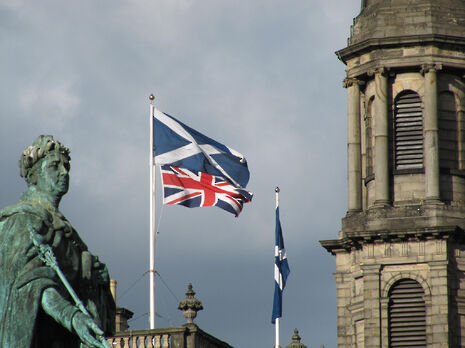Psychology and the Scotland Referendum: mind over matter?
Freddie Green offers an intriguing analysis of the role played by psychology in the Scotland referendum.

Monica Crowley, the American political commentator, once said, “Voting is as much an emotional act as an intellectual one.” When it comes to the Scotland referendum, much attention has been paid to the economic and political arguments. Few reports, however, have focused on the “emotional”, the psychological side of this debate.
As voters, our decisions are coloured by an innate fear of being responsible for bad outcomes, explains Dr William Matthews of Cambridge University. “People would rather commit a sin of omission rather than commission.” He raises the example of parents’ reluctance to vaccinate their children against infection. Even if the risk of side effects is far lower than that of the infection, parents still hesitate about immunising their children. They don’t want to be responsible for unnecessary nausea or flu.
On a basic level, the Scotland debate is not too different. Just one month ago, polls suggested that the default outcome would be for Scotland to remain part of the Union. Voting Yes would therefore mean accepting responsibility for the risky side effects of independence: a potential financial slump, lack of EU membership, and much more. That’s a burden nobody wants to bear.
But if Scotland becoming independent were to become seen as the 'default' outcome, however, everything changes. When YouGov published its poll results one week ago showing the Yes campaign in the lead, it didn’t just give Alex Salmond an ego boost; it psychologically reframed the decision that voters would be taking.
“Voting No now becomes the pro-active step, which raises the possibility of anticipated regret if the outcome is enacted but then found to be unfavourable,” says Dr Matthews. In other words, voting for the Union would be seen as going against the flow, and voters would now be more fearful of tethering Scotland down. This could go some way to explaining the late surge in Yes approval ratings.
There are other factors at play in the debate; namely, a sense of national identity. “I would say that, for many Scots, national identity is very strong, enough to overcome aversion to change,” says Diana Rice, an occupational psychologist. A 2003 study into EU referendums found a similar result: national identity has been proven to supersede worries over risk and loss.
That’s something that will count in Salmond’s favour. A 2011 census found that 61 per cent of Scots feel “only Scottish”, while a mere 18 per cent feel Scottish and British. So, even with the threat of rising energy prices or lack of stable currency in an independent Scotland, national identity could be potent enough to make voters ignore these potential risks. It might not be rational, but it’s a vote-winner.
Then there’s the question itself, "Should Scotland be an independent country?" Its phrasing constitutes a psychological advantage for Salmond, for it meant that his supporters would become known as the 'Yes' side, while Unionists would become the 'No' side, condemning them to psychological associations of negativity.
In becoming the No campaign, Unionists have had to engage in 'negative campaigning', pointing out all the potential flaws of an independent Scotland. But, as Rice points out, negative campaigning is a risky affair.
“It’s very tricky, it sets up a negative response and ends up feeling like personal criticism. In my view, it’s counterproductive. The confidence to point out the positive without having to knock the opposition would make a difference.”
In a 2007 analysis of studies conducted into negative campaigns, nearly 30 out of 43 surveys concluded such tactics have detrimental effects, including reducing support for the campaigner and decreasing voter turnout. While Salmond can preach the potential advantages of a theoretically independent Scotland, the onus is on Darling to discredit it, and such tactics can often lead to a public backlash. Only last week, Darling was accused by Yes supporters of heading a “patronising”, “narrow” and “negative” campaign.
His recent charm offensive in Scotland might just change that. But uncertainty still lingers over Scotland’s potential currency, its banks’ contingency plans, and the future of its MPs in Westminster. And with so many unanswered questions, the psychology of voters in these final hours might just swing the balance.
What are your thoughts on the #indyref? Tweet us @VarsityUK
 Comment / Plastic pubs: the problem with Cambridge alehouses 5 January 2026
Comment / Plastic pubs: the problem with Cambridge alehouses 5 January 2026 News / Cambridge businesses concerned infrastructure delays will hurt growth5 January 2026
News / Cambridge businesses concerned infrastructure delays will hurt growth5 January 2026 News / New movement ‘Cambridge is Chopped’ launched to fight against hate crime7 January 2026
News / New movement ‘Cambridge is Chopped’ launched to fight against hate crime7 January 2026 News / Uni-linked firms rank among Cambridgeshire’s largest7 January 2026
News / Uni-linked firms rank among Cambridgeshire’s largest7 January 2026 News / AstraZeneca sues for £32 million over faulty construction at Cambridge Campus31 December 2025
News / AstraZeneca sues for £32 million over faulty construction at Cambridge Campus31 December 2025









